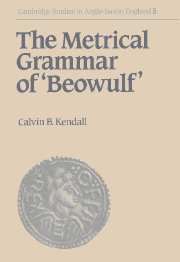Book contents
- Frontmatter
- Contents
- Preface
- List of abbreviations
- List of changes from Klaeber's text
- 1 The Beowulf-poet and his metrical grammar
- 2 The alliterative and metrical principles of Beowulf: Kuhn's ‘laws’ and the transformational rule
- 3 The three kinds of half-lines: extra-metrical alliteration and type A3
- 4 Displacement
- 5 Stressed proclitic adjectives: X-positions and the insertion rule
- 6 Problems with the identification of clause-non-initial half-lines: the proclitic onset
- 7 Half-lines with internal clause divisions: the transformational rule (revised)
- 8 The alliterative requirement of unstressed prefixes and the copulative conjunctions
- 9 The alliterative requirement of prepositions and the proclitic adverbs and instrumentals
- 10 The alliterative requirement of proclitic adjectives and pronouns: the alliterative rule of proclitics
- 11 Displaced and detached proclitics
- 12 The three classes of compounds: the alliterative requirement of class I compounds
- 13 The alliterative behaviour of class II compounds
- 14 The alliterative behaviour of class III compounds and simplexes
- 15 Metrical typology and the metrical grammar
- 16 Conclusions
- Appendix: A typology of the metre of Beowulf in relation to the metrical grammar
- Glossary of technical terms
- Bibliography
- Index of alliteration, scansion and metrical clause structure
- Index of verses specially discussed
4 - Displacement
Published online by Cambridge University Press: 22 September 2009
- Frontmatter
- Contents
- Preface
- List of abbreviations
- List of changes from Klaeber's text
- 1 The Beowulf-poet and his metrical grammar
- 2 The alliterative and metrical principles of Beowulf: Kuhn's ‘laws’ and the transformational rule
- 3 The three kinds of half-lines: extra-metrical alliteration and type A3
- 4 Displacement
- 5 Stressed proclitic adjectives: X-positions and the insertion rule
- 6 Problems with the identification of clause-non-initial half-lines: the proclitic onset
- 7 Half-lines with internal clause divisions: the transformational rule (revised)
- 8 The alliterative requirement of unstressed prefixes and the copulative conjunctions
- 9 The alliterative requirement of prepositions and the proclitic adverbs and instrumentals
- 10 The alliterative requirement of proclitic adjectives and pronouns: the alliterative rule of proclitics
- 11 Displaced and detached proclitics
- 12 The three classes of compounds: the alliterative requirement of class I compounds
- 13 The alliterative behaviour of class II compounds
- 14 The alliterative behaviour of class III compounds and simplexes
- 15 Metrical typology and the metrical grammar
- 16 Conclusions
- Appendix: A typology of the metre of Beowulf in relation to the metrical grammar
- Glossary of technical terms
- Bibliography
- Index of alliteration, scansion and metrical clause structure
- Index of verses specially discussed
Summary
The mechanism of displacement plays an important part in the metrical grammar of the Beowulf-poet. When a sentence particle is displaced from its normal unstressed position in the first dip of the clause, it will be marked by alliteration or it will take metrical stress or both.
Displacement is spoken of as though it referred to a procedure whereby the poet would remove a word from its normal syntactical position and insert it somewhere else in the verse clause. But this assumption will not adequately account for all the observed phenomena. Furthermore, it is rooted in a prior assumption – that Old English poetry was essentially, not just secondarily or superficially, the product of a literate culture. We can readily imagine a poet, pen in hand, mentally shifting a word from its expected position in one verse and fitting it into some other verse, possibly several lines removed, while making the necessary adjustments in both verses in order to preserve their proper rhythms. But to suppose that an oral poet, employing the traditional half-line formulae, could or would engage in such mental gymnastics in the midst of an extemporaneous performance seems intuitively unlikely. Even if, as I assume, the Beowulf-poet and others like him in the monastic culture of Anglo-Saxon England wrote down their poems by a process of self-dictation, their steady reliance on the traditional formulae and formulaic systems implies that they continued to practise the techniques of oral composition.
- Type
- Chapter
- Information
- The Metrical Grammar of Beowulf , pp. 43 - 59Publisher: Cambridge University PressPrint publication year: 1991



